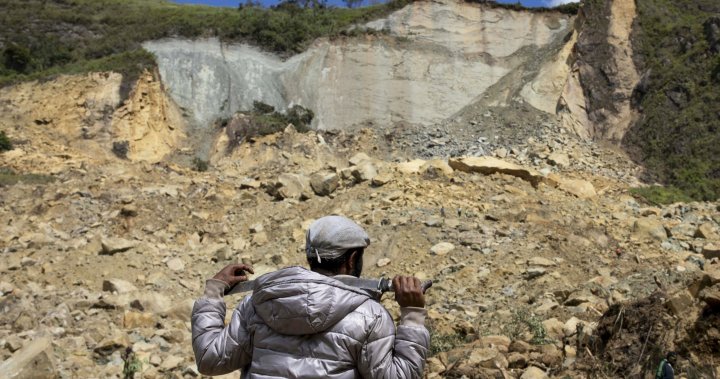The site of a devastating landslide in Papua New Guinea estimated to have killed hundreds of villagers will become a “mass burial site” after a search for survivors ends Thursday, the United Nations says.
That’s when a 14-day window provided by local officials will expire in the affected area, which remains unstable and could lead to more landslides that threaten thousands more people.
“The unrecovered bodies will be declared missing persons, and the landslide site will be designated a mass burial site with monuments erected,” a spokesperson for the U.N. International Organization for Migration (IOM) said in an update on Wednesday.
The landslide came down in a remote and mountainous area of Enga province in the South Pacific country on May 24. Up to eight metres of debris cut off the main highway to the Yambali village, where 150 homes were buried in the early morning hours.
Access issues and poor weather have made it difficult for the military and a nearby gold mine operated by Canadian company Barrick to deliver the heavy machinery required to excavate the site. Rescuers and residents have used sticks, small tools and their own hands to dig through the rubble.
The U.N. estimates that 670 villagers died in the disaster, which immediately displaced 1,650 survivors. Papua New Guinea’s government has said it thinks more than 2,000 people were buried alive.
The IOM said Sunday that only nine bodies have been recovered.

The sensitivities of grieving villagers and ongoing tribal conflicts in the region are also obstacles to the mechanized removal of a huge quantity of debris, officials say.
The email you need for the day’s
top news stories from Canada and around the world.
Local authorities provided a 14-day window to find survivors and the deceased, after which access will be restricted to prevent the spread of disease from decaying bodies. The U.N. has also said water flowing under the debris had contaminated the village’s water sources.
The U.N. says geotechnical reports in recent days have found the area remains unstable, with heavy rains making conditions worse. A New Zealand survey team has recommended all residents in high-risk areas — around 7,400 people — be evacuated and relocated immediately, the IOM spokesperson said Wednesday.
The agency said all 600 households in the affected area have received food as of Wednesday, with non-food aid kits set to be prepared Thursday and distributed “soon.”
UNICEF and other international aid groups have been on the ground providing food, water, medical supplies and temporary shelters for survivors who lost their homes in the slide.
Villagers carry donated food aid at a temporary site for the displaced, following the May 24 landslide near Yambali village in the highlands of Papua New Guinea, Monday, June 3, 2024. (Juho Valta/UNDP Papua New Guinea).
Villagers wait as food aid is distributed at a temporary site for the displaced, following the May 24 landslide near Yambali village in the highlands of Papua New Guinea, Monday, June 3, 2024. (Juho Valta/UNDP Papua New Guinea).
A group of survivors from the May 24 landslide in Inga Province, are smeared in mud as a sign of mourning, gather at an event where Prime Minister James Marape was to address them at Kaokalom village, in the highlands of Papua New Guinea, Friday May 31, 2024. Marape visited the site of a major landslide, which is estimated to have buried hundreds of villagers in the South Pacific island nation’s mountainous interior over a week ago and left the ground too unstable for heavy earthmoving machines to help clear up the mess. (Noreen Chambers,UNICEF PNG).
Papua New Guinea Prime Minister James Marape visited the site last week and pledged 20 million kina (US$5.1 million) for emergency response and initial recovery measures.
Australia, a close neighbour, has pledged millions of dollars to the recovery effort. The United States, China and other countries have also said they are ready to help.
International Development Minister Ahmed Hussen has promised Canada is standing by to provide aid and other resources if needed, and told Global News last month he was waiting for a specific request. Since then, however, no announcement has been made.
Global News has reached out to Hussen’s office for comment.
— With files from the Associated Press and Reuters
© 2024 Global News, a division of Corus Entertainment Inc.





